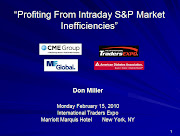 As has happened from time to time over the years, I received an email from a guy the other day wanting me to consider buying his "black box" system for a six figure sum -- to which I responded with one word ... "cute".
As has happened from time to time over the years, I received an email from a guy the other day wanting me to consider buying his "black box" system for a six figure sum -- to which I responded with one word ... "cute". We then exchanged a few more notes, including one which described a specific entry and exit that the box triggered -- to which I responded along the lines of "already took it ... and at a better price".
Now before I comment further, I respect both the man sending the email, as well as the notion that mechanical systems are one option to consider when pursuing this business, and thus have a place in the industry. So my following comments should in no way be interpreted as a "diss" to either.
1. I enjoy trading. To me, trading will always be a mental sport not unlike chess, poker, or any strategic game. And yes, it's a game -- a game that despite my occasional moaning and groaning, I will always love with a very deep inner passion. Larry Bird was once asked how he could "work" so hard every day by getting up at 5 or 6am and shooting a few hundred baskets before most of the world was even up. He responded along the lines of, "This has never been work for me. It's a game and my passion." Same goes at this end.
2. I enjoy the daily strategic challenge. Trading for me is like doing a double-sided jigsaw puzzle on a daily basis. As I've said in the past, I love puzzles. And I also happen to be fairly good at them. Same goes for poker, which continues to make trading seem far "easier" in comparison.
Case in point, during my trek to Foxwoods over the weekend, I got beat three times in a moderate-stakes cash game on the river after holding very high-probability hands ... some well over 90% heading to the final card. Contrast that with this week's trading sequences on similar probability which as I write this at noon on Wednesday as the class and I take a break during the deadzone, stands at 29 wins and 5 losses ... with no river suck-outs plus the option to take money out of the pot if it goes against me.
Case in point, during my trek to Foxwoods over the weekend, I got beat three times in a moderate-stakes cash game on the river after holding very high-probability hands ... some well over 90% heading to the final card. Contrast that with this week's trading sequences on similar probability which as I write this at noon on Wednesday as the class and I take a break during the deadzone, stands at 29 wins and 5 losses ... with no river suck-outs plus the option to take money out of the pot if it goes against me.
 3. Adaptability. Most systems require that no "tinkering" be done to them, and some prohibit the use of any discretion. For doing so would alter the probability that was established based on a specific set of constants. Yet, to use an airline industry analogy, there are key times when not only would I prefer a human pilot vs. auto-pilot, I'd mandate it. For when the "geese hit the engines", I want that pilot with all his experience and judgment to assess the situation, find the safe way out, and land successfully.
3. Adaptability. Most systems require that no "tinkering" be done to them, and some prohibit the use of any discretion. For doing so would alter the probability that was established based on a specific set of constants. Yet, to use an airline industry analogy, there are key times when not only would I prefer a human pilot vs. auto-pilot, I'd mandate it. For when the "geese hit the engines", I want that pilot with all his experience and judgment to assess the situation, find the safe way out, and land successfully. btw, congrats to "Sully" Sullenberger who announced his official retirement today. And here's a great simulation of the Hudson River landing, complete with the real air traffic conversations.
Add to this the fact that some systems are outdated the moment they hit the marketing shelf (the old, "once you find the key, the market changes the lock" trader adage), and the game quickly becomes one of musical chairs.
4. Similar Results. In the end, I firmly believe that the results of a successful discretionary trader and one who relies on a system should be at worst similar, which only provides incremental upside for the trader incorporating human judgment on a moment by moment basis. And while there will undoubtedly be times when a system has its advantages and will outperform even the best trader, the opposite will also be true. And in each case, they both simply put probability on your side.
###
Again, systems or "boxes" -- whether they're black, brown, pink, or chartreuse -- have a place in this business. They can circumvent trader emotion and eliminate the need for on-the-spot decision making, while often decreasing the time needed to monitor markets. And if properly programmed, they'll provide an edge for a trader who doesn't have an edge, and/or who doesn't have the time or desire to become a successful discretionary trader.
Yet I'll take "Trader Self-Sufficiency for $1,000,000" Alex.
For as one trader told me sometime last year, "I think I finally figured out your edge. Your edge is 'you' ".
I suppose in a way, he's right.
For despite all the imperfections that discretionary traders have -- and this trader has too many to list -- ultimately the bottom line defines whether an edge truly exixts. And to that, there can be no dispute.
Plus, I love shooting baskets.
















1 comment:
Our friend Coach Rut has the REAL black box (Max Effort Black Box), and it's a workout program! Same thing as real trading, nobody does it for you.
http://www.crossfitkc.com/gear.php?productID=50
Post a Comment